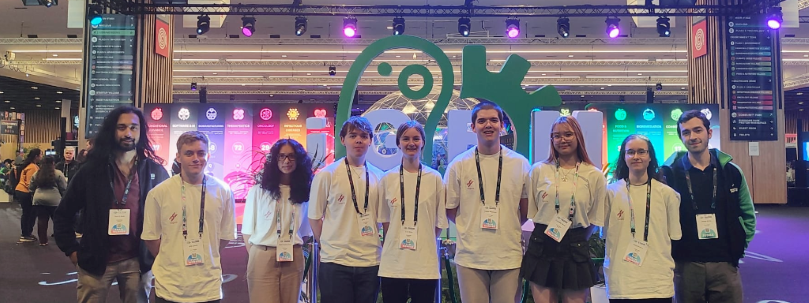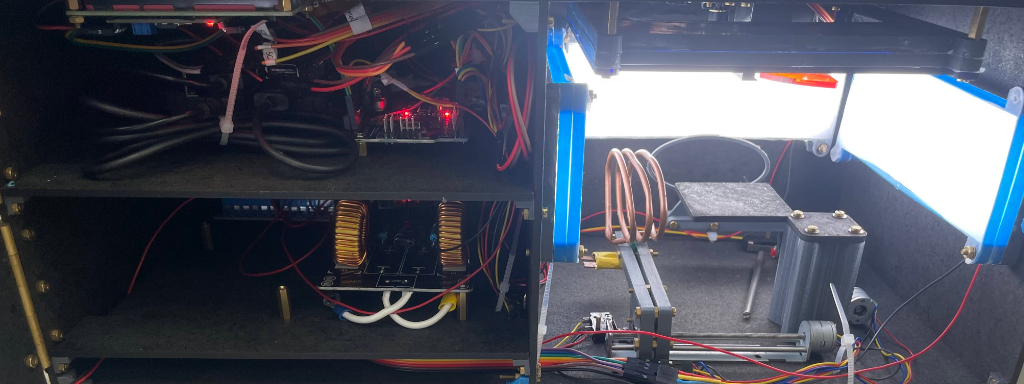
The Cambridge 2024 International Genetically Engineered Machines (iGEM) team was awarded a Gold Medal at the iGEM2024 Synthetic Biology competition finals. The Cambridge team, which included two engineering students, Lisa Milne (1st year Engineering) and Gus Molyneux (3rd year Engineering), were awarded the medal for their project ‘MaGenTa’ developing tools for magnetogenetics, an approach using magnetic fields to remotely and precisely control gene activation.
The iGEM competition provided an incredible opportunity to collaborate within a cross-disciplinary team on a project that was both interesting and unlike anything I had experienced before.
Lisa Milne 1st year Engineering undergraduate
The Cambridge iGEM team also received a nomination for the ‘Best Hardware’ special prize in the Undergrad Category at the 2024 iGEM Grand Jamboree.
iGEM is the world’s largest synthetic biology competition and community. Each year thousands of students, representing teams from over 400 universities worldwide, work on projects in the lab to solve real-world problems using Synthetic Biology.
Meet the Team
This year, the Cambridge team comprised an interdisciplinary group of 9 undergraduate students, supported by an Instructor and Advisor Team formed of PhD Students and iGEM Alumni. Team members came from a variety of backgrounds: Holly Bristow (1st year Natural Sciences), Will Cassie (1st year Natural Sciences), Linhan Lei (1st year Natural Sciences), Lisa Milne (1st year Engineering), Gus Molyneux (3rd year Engineering), Dhriti Rao (3rd year Genetics), Jamie Terry (1st year Chemical Engineering and Biotechnology), Cenyujia Wang (1st year Natural Sciences), Roger Wang (1st year Natural Sciences).
Watch the team’s presentation video above summarising the project details.

The 2024 Cambridge iGEM team
MaGenTa: Biological and Hardware Tools for Magnetogenetics
Their project was in the field of magnetogenetics, which makes use of magnetic fields to control gene expression. While spatiotemporal control of gene expression is crucial for many fields, such as neuroscience and organoid research, current methods are limited by factors such as cost and penetration depth. The team believes that a magnetogenetics approach could help overcome these limitations, and aimed to develop a set of biological and hardware-based tools that would allow precise control of gene expression using magnetic fields, with their efforts earning them a “Gold Medal”

A photo of the inside of the MaGenTa hardware. On the right is an illuminated chamber with a platform for specimens and a coil. On the right are a series of wiring, microprocessor boards and coils.
They were also nominated for the “Best Hardware” special prize, in recognition of their system that allowed the movement of electromagnetic coils around a plate of cells and an imaging system to capture fluorescence and heat information. This hardware drew a lot of excitement when presented at both the Cambridge MakeSpace and the iGEM Jamboree. While the project was quite foundational, the team met with experts in various fields where they felt it could be applied, such as neuroscience and oncology, to ensure that key features for application (such as spatial resolution and toxicity) were considered throughout.
Further Information
To register an interest in sponsoring future Cambridge iGEM teams and to keep up to date with news, events and iGEM via the Cambridge University SynBioSoc Slack channel visit the Engineering Biology in Cambridge website
The team’s wiki documenting their work on the project.
Credits and Acknowledgements
The team is extremely grateful for sponsorship from university-affiliated bodies, the School of Biological Sciences, Department of Engineering, Student-led Projects and Industry Partnership (SPIP), Cambridge Centre for Data-Driven Discovery (C2D3) and the Engineering Biology Interdisciplinary Research Centre (EngBio IRC), as well as from companies MicroMod, NEB, Beckman Coulter, and BMG LabTech.
The team would also like to thank the team of instructors that advised them throughout the project: Kavi Shah, Chi Ki Leung, Jarrod Shilts, Georgeos Hardo, Sharon Ho, Johann Sora Blakytny, Kieran Abbott. They also thank the Department of Engineering, Dr. Somenath Bakshi and Mr James Macleod for providing lab space.
This news was originally published on the Engineering Biology in Cambridge website

